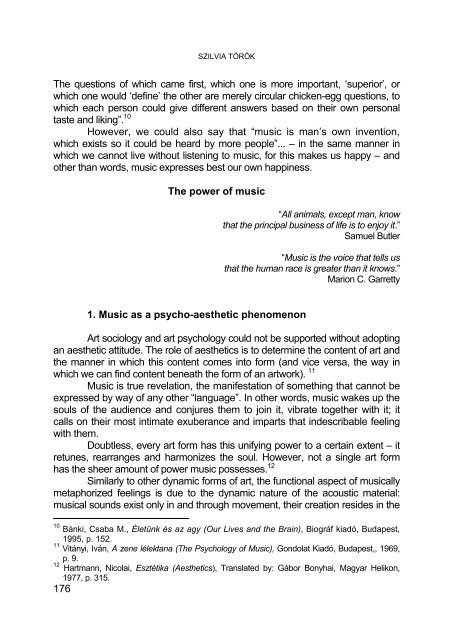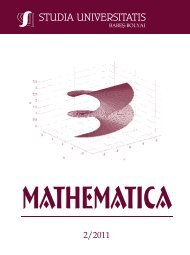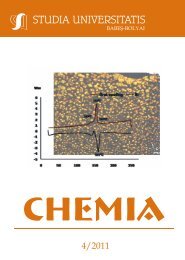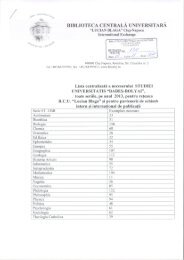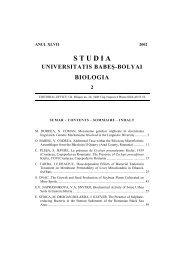musica - Studia
musica - Studia
musica - Studia
You also want an ePaper? Increase the reach of your titles
YUMPU automatically turns print PDFs into web optimized ePapers that Google loves.
SZILVIA TÖRÖK<br />
The questions of which came first, which one is more important, ‘superior’, or<br />
which one would ‘define’ the other are merely circular chicken-egg questions, to<br />
which each person could give different answers based on their own personal<br />
taste and liking”. 10<br />
However, we could also say that “music is man’s own invention,<br />
which exists so it could be heard by more people”... – in the same manner in<br />
which we cannot live without listening to music, for this makes us happy – and<br />
other than words, music expresses best our own happiness.<br />
The power of music<br />
“All animals, except man, know<br />
that the principal business of life is to enjoy it.”<br />
Samuel Butler<br />
“Music is the voice that tells us<br />
that the human race is greater than it knows.”<br />
Marion C. Garretty<br />
1. Music as a psycho-aesthetic phenomenon<br />
Art sociology and art psychology could not be supported without adopting<br />
an aesthetic attitude. The role of aesthetics is to determine the content of art and<br />
the manner in which this content comes into form (and vice versa, the way in<br />
which we can find content beneath the form of an artwork). 11<br />
Music is true revelation, the manifestation of something that cannot be<br />
expressed by way of any other “language”. In other words, music wakes up the<br />
souls of the audience and conjures them to join it, vibrate together with it; it<br />
calls on their most intimate exuberance and imparts that indescribable feeling<br />
with them.<br />
Doubtless, every art form has this unifying power to a certain extent – it<br />
retunes, rearranges and harmonizes the soul. However, not a single art form<br />
has the sheer amount of power music possesses. 12<br />
Similarly to other dynamic forms of art, the functional aspect of <strong>musica</strong>lly<br />
metaphorized feelings is due to the dynamic nature of the acoustic material:<br />
<strong>musica</strong>l sounds exist only in and through movement, their creation resides in the<br />
10 Bánki, Csaba M., Életünk és az agy (Our Lives and the Brain), Biográf kiadó, Budapest,<br />
1995, p. 152.<br />
11 Vitányi, Iván, A zene lélektana (The Psychology of Music), Gondolat Kiadó, Budapest,, 1969,<br />
p. 9.<br />
12 Hartmann, Nicolai, Esztétika (Aesthetics), Translated by: Gábor Bonyhai, Magyar Helikon,<br />
1977, p. 315.<br />
176


